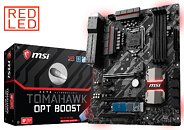Thursday, May 18th 2017

Intel Pushes Motherboard + Optane Bundles, "Coffee Lake" in August
Back in April, we reported motherboard manufacturer MSI bundling Intel's Optane cache SSD with a few of its mid-range motherboards. While not free, the bundle would be slightly cheaper than the sum of its parts (buying the board and SSD separately). At the time we predicted that other motherboard vendors could launch similar bundles. It turns out that Intel is indeed coordinating motherboard + Optane SSD bundles.
In a bid to boost sales of its 200-series chipset motherboards and Core "Kaby Lake" processors, Intel is coordinating bundles of motherboards across brands with its Optane cache SSDs. Analysts predict that this could be an inventory-clearing exercise by Intel, because it plans to launch its next-generation Core "Coffee Lake" processors by late-August, 2017. "Coffee Lake" will see the introduction of six-core processor SKUs to Intel's mainstream-desktop platform, which is currently led by the quad-core i7-7700K "Kaby Lake."In all likelihood, Intel could change the socket with "Coffee Lake," and introduce a new chipset, making current 200-series chipset boards and Core "Kaby Lake" processors bad options. The company already pushed two generations of processors, the 6th generation Core "Skylake" and 7th generation Core "Kaby Lake" through the LGA1151 platform, which has two generations of chipset - 100-series and 200-series. Given that Intel isn't going to transition from its current 14 nm process in the near-term, a 14 nm six-core processor could likely have higher electrical requirements than what the LGA1151 socket can afford. Add to that, Intel's quad-core "Kaby Lake" parts already ship with TDP as high as 91W.
In the meantime, Intel has its eyes on the over 130 motherboard models that are based on 200-series chipset, and support Optane SSD caching.
Source:
DigiTimes
In a bid to boost sales of its 200-series chipset motherboards and Core "Kaby Lake" processors, Intel is coordinating bundles of motherboards across brands with its Optane cache SSDs. Analysts predict that this could be an inventory-clearing exercise by Intel, because it plans to launch its next-generation Core "Coffee Lake" processors by late-August, 2017. "Coffee Lake" will see the introduction of six-core processor SKUs to Intel's mainstream-desktop platform, which is currently led by the quad-core i7-7700K "Kaby Lake."In all likelihood, Intel could change the socket with "Coffee Lake," and introduce a new chipset, making current 200-series chipset boards and Core "Kaby Lake" processors bad options. The company already pushed two generations of processors, the 6th generation Core "Skylake" and 7th generation Core "Kaby Lake" through the LGA1151 platform, which has two generations of chipset - 100-series and 200-series. Given that Intel isn't going to transition from its current 14 nm process in the near-term, a 14 nm six-core processor could likely have higher electrical requirements than what the LGA1151 socket can afford. Add to that, Intel's quad-core "Kaby Lake" parts already ship with TDP as high as 91W.
In the meantime, Intel has its eyes on the over 130 motherboard models that are based on 200-series chipset, and support Optane SSD caching.

20 Comments on Intel Pushes Motherboard + Optane Bundles, "Coffee Lake" in August
Competition at it's best, more power, innovation and lower prices, a bright x86/x64 future ahead of us.
Not only is it not any better than an entry level SSD, it’s more expensive and only works within a very specific setup.
Maybe v2 will be better (if it doesn’t die out by then). Either way it’s yet another disappointment, which Intel has been having a lot lately.Don’t think anyone was seriously expecting that they wouldn’t change the chipset, or even the socket.
1150 had 2 CPU and 2 chipset revisions, after that 1151 came out. The story repeats, 2 CPU and 2 chipsets revisions, and it’s time for a new socket and CPU.
Well AMD can make 65W 8-core chips (R7 1 700). That said Intel can also make them (Xeon), it’s just that they are well below 2GHz.
And this silly limiting to latest chipsets just makes it even less interesting for everyone. I mean, most people who buy Z270 chipset today would rather just buy a larger SSD than use hybrid. Which kinda defeats the purpose of Optane by itself. I mean, if you spend 1500 on new system, what difference does extra 300€ make, really for a 1+ TB SSD...
But for whatever reason, Intel is displaying whatever this is, as the picture of an Optane ready board...